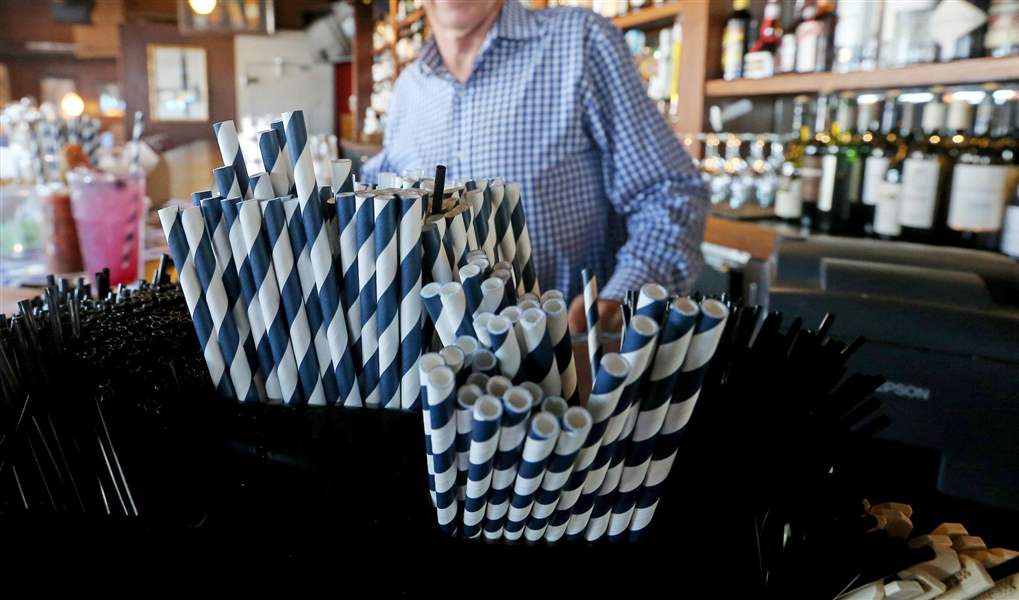
Good reason to skip the plastic straws
7/10/2018
Paper straws sit at Duke Moscrip, owner of Duke's Restaurants, bar at his restaurant in Seattle.
AP
It’s common practice in restaurants for servers to bring drinks to the table and then pull a few straws out of an apron pocket to go along with them. Absentmindedly, customers unwrap those straws and start sipping.

But plastic is not biodegradable. According to thelastplasticstraw.org, a site dedicated to encouraging the reduction of plastic waste – especially single-use items, like straws – “it photo degrades into smaller and smaller pieces, which [get] ingested by marine and land animals.”
In February, National Geographic reported that the size of straws “makes them one of the most insidious polluters because they entangle marine animals and are consumed by fish.”
So, what if you had to ask for a straw rather than it being an automatic giveaway? As of July 1, a new policy took effect in Seattle that bans providing plastic straws and utensils except by explicit request.
And what if you were charged for that request?
Consider this: The BBC reported recently that the University of Winchester used to go through 191,000 disposable cups in a year.
To reduce waste, an initial program had offered a discount for those who brought their own reusable cups. But this measure wasn’t very effective in changing behavior.
So a new plan cut the cost of all hot drinks by 25 pence, then added a charge of 25 pence for a disposable cup.
The negative consequence vs. a positive reward saved 34,000 cups per year.
So, in addition to having to request a straw, a simple charge of 25 cents for a plastic one might be a way to discourage customers from using them. Or maybe bump that up a bit?
“Could I have a straw, please?” you might ask your server.
“That’ll be an extra 50 cents,” would be the reply.
How would you respond? “That’s okay, I’ll pay it.” Or, “Oh, thanks anyway. I’ll do without.”
What price would serve as a deterrent? How much is your straw habit worth to you?
There are washable metal and silicone straws, and also the option of using paper straws instead of plastic ones. It would be great if area restaurants could make the swap.
HoChan “C.J.” Jang, co-owner of Balance Pan-Asian Grille, said that his restaurants will be switching to paper straws for standard beverages. When I saw him awhile ago and simply uttered the words “plastic straws,” he nodded, already knowing what my question would be.
Bubble tea straws, though, which are larger, are not yet adequate in paper versions, C.J. said; and this beverage is one of Balance’s specialty items, particularly popular during the summer. But he is hopeful that a substitute can soon be found.
I admit that I’m a bit of a germophobe. For example, if a French fry falls onto the table at a restaurant, I won’t eat the stray spud.
So there’s a strong part of me that prefers to unwrap a brand new straw rather than put my lips onto a glass that’s been through the cycle of wash, rinse, repeat. (Yes, I know I’m putting a fork into my mouth that’s been used by others. I never claimed to be rational, only confessional.)
But now, I ignore the straw and drink directly out of the glassware.
One of our photographers, Samantha Madar, told me that when she goes out and a plastic straw is placed in front of her, she pushes it aside, saying “Save the turtles.”
Paper, not plastic. It’s not just about bags, anymore.
Contact Mary Bilyeu at 419-724-6155 or mbilyeu@theblade.com, and follow her at facebook.com/thebladefoodpage.